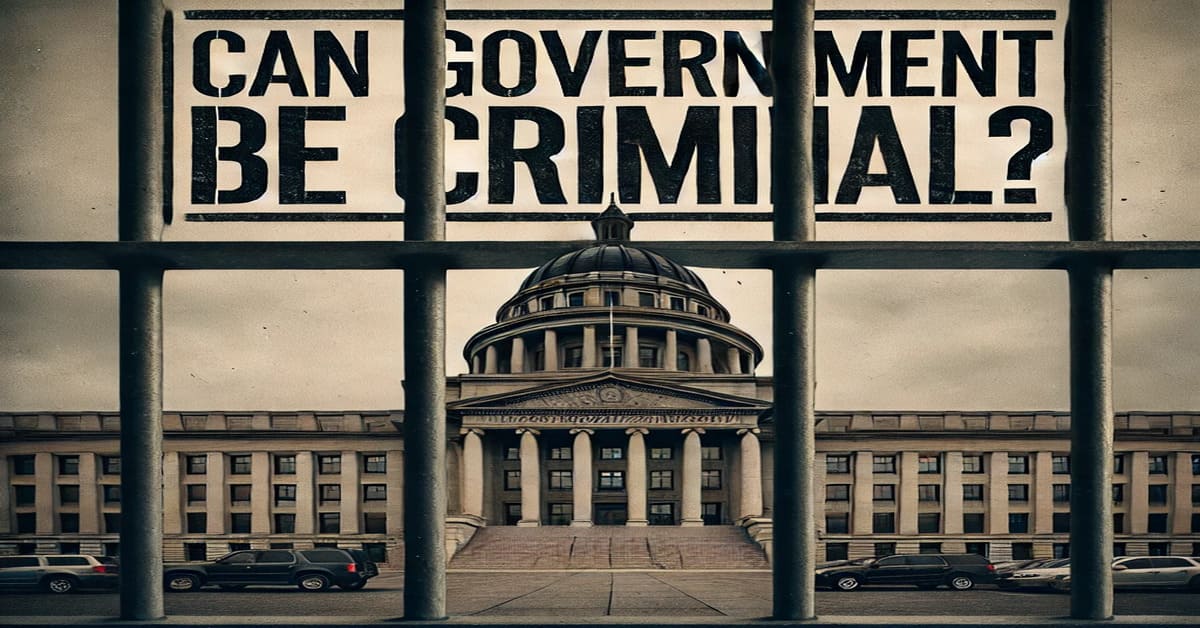Can the Government Be a Criminal?
In a time when policies seem more like tools for political gain than public welfare, one question looms large: Can the government itself be a criminal? As bizarre as this might sound, recent events involving Union Finance Minister Nirmala Sitharaman, Delhi Chief Minister Arvind Kejriwal, and Jharkhand Chief Minister Hemant Soren compel us to explore the uneasy relationship between legal immunity, policy-making, and extortion.
With the Enforcement Directorate (ED) and Income Tax officials themselves named in FIRs, we are left wondering: when does governance cross the line into legalized corruption?
The Extortion Disguised as Policy

Union Finance Minister Nirmala Sitharaman was found named in an FIR accusing her of extortion in connection with the electoral bonds scheme. The electoral bonds scheme, sold to the public as a transparent funding mechanism, has been widely criticized for its opacity and potential to enable large-scale corporate donations that are anything but transparent. By masking political donations behind legal instruments like electoral bonds, the government appears to have created a system that is technically legal but morally questionable or corrupt. The question arises: Is this a sophisticated form of extortion under the cover of law? OR, Is this all a legalised corruption? OR Is extortion, not a criminal act if the extortionist is the government?
The case of Delhi Chief Minister Arvind Kejriwal adds another layer to this— an FIR and judicial custody for money laundering related to the Delhi liquor policy. Initially designed to increase revenue and regulate the liquor trade, the policy allegedly became a tool for financial kickbacks, with liquor contractors lining the party’s coffers through illicit transactions. Here, the fine line between governance and corruption has been blurred by legal cover, leaving us to question whether these policies were ever about public good.
Nevertheless, what truly stands out is this: If the money involved in the Delhi liquor policy scandal had been taken through a cheque, it would have been deemed money laundering. Yet, if the same funds had been donated anonymously through electoral bonds, it would have been entirely legal. Such is the absurdity of the current system, where the mode of transaction determines its legality, not the underlying ethical breach. And now, with the Electoral Bonds Scheme declared unconstitutional by the Supreme Court of India, doesn’t that raise the need for a thorough investigation into all transactions made under its provisions?
Jharkhand CM Hemant Soren faces similar allegations, with an FIR and jail time accusing him of laundering money through illegal mining activities. Judicial custody further underscores the gravity of these accusations. Once again, a government leader, elected by the people, seems to have used policy as a pretext for personal financial gain, all while staying technically within legal bounds.
Bureaucratic Paralysis: The Silent Accomplice
But it’s not just the politicians. Bureaucrats famously called Civil Servants, the so-called steel frame of India, have become increasingly paralyzed by fear of prosecution. Once tasked with implementing policy, many now hesitate, terrified that a signature on the wrong contract could lead to accusations of corruption, money laundering or extortion. The legal immunity they once enjoyed to shield them from frivolous lawsuits now feels like a fragile protection, easily pierced by the political winds.
Bureaucrats who once had the autonomy to make decisions are now often reduced to subservient cogs, terrified of stepping out of line without a minister’s blessing. In a system where the Enforcement Directorate could show up at your door for issuing a simple circular, who would dare make decisions? The result is a government that functions on the surface but is frozen underneath— a ship that appears to sail, but in reality, is slowly sinking.
The Government Writes the Rules of Crime
At the crux of this issue lies a fundamental truth: the government defines what constitutes a crime. Through its constitutional authority, the government writes laws, enforces them, and decides who should face prosecution. In a democratic setup, this should ensure accountability. But what happens when the government itself manipulates this process for personal or political gain?
Consider the case of electoral bonds. Touted as a policy to bring transparency, the reality is starkly different. It allows the ruling party to collect enormous sums of money anonymously, giving it an insurmountable electoral advantage. It’s perfectly legal. But is it ethical? If the law shields this form of political extortion, are we to believe that no crime has been committed?
Similarly, in the cases of Kejriwal and Soren, the policies under scrutiny were crafted by elected leaders under constitutional authority. They weren’t rogue acts of corruption; they were government-sanctioned initiatives. Does this mean they are above reproach? Or does the selective application of laws indicate something more insidious— a government using the veil of legality to cover up what could very well be criminal extortion?
The UP Government: Immunity from Crimes?
This brings us to one of the most blatant examples of legal immunity in action: the Yogi Adityanath government in Uttar Pradesh. As soon as it came to power, it withdrew around 25 criminal cases against a person known formerly as Ajay Singh Bisht, and now as Yogi Adityanath. These were no minor infractions. These were cases serious enough to make him cry in the Parliament, fearing arrest. Yet, as soon as the government changed, those cases evaporated, not by legal trial, but by executive decree.
What does it say about a government when it has the power to pardon itself for crimes it committed? What precedent does this set for accountability when a sitting government can erase its own legal history with the stroke of a pen? The immunity that was meant to shield public servants from frivolous charges has now become a tool to erase even the most egregious criminal accusations. Is this not a form of institutionalized corruption?
Governance or Legalized Corruption?
The criminalization of policy-making and the politicization of crime have paralyzed governance. Ministers and bureaucrats, afraid of legal repercussions, now hesitate to implement bold policies. While this may prevent some corruption, it also slows down governance, creating a system where decisions are deferred indefinitely, and public welfare initiatives are lost in the shuffle.
But make no mistake—those in power have not stopped finding new and innovative ways to exploit the system. Whether it’s through anonymous political donations via electoral bonds or alleged money laundering under the cover of public policy, the ability of government officials to manipulate laws for personal gain is both troubling and telling.
The question remains: Can the government be a criminal? In a political landscape where policies can serve both governance and corruption in equal measure, the line between lawful authority and criminal extortion becomes increasingly hard to define.
Conclusion: A Question of Accountability
As we look at the cases of Nirmala Sitharaman, Arvind Kejriwal, Hemant Soren, and Yogi Adityanath, one thing is clear: governance in India is facing an ethical crisis. The legal immunity enjoyed by government officials may protect them from prosecution, but it doesn’t absolve them of moral culpability. The policies they craft, though legal, often serve as convenient tools for political and financial gain.
The answer to whether the government can be a criminal may never be clear-cut. But as we continue to witness the manipulation of laws and policies for personal benefit, one thing is certain: if we don’t address these issues, history will judge us all and this era of governance, very harshly.
And perhaps, in the eyes of history, the government that exploits its power to extort, launder, and shield itself from accountability is a criminal.
To read about Hindus in Hindu Rashtra click here
